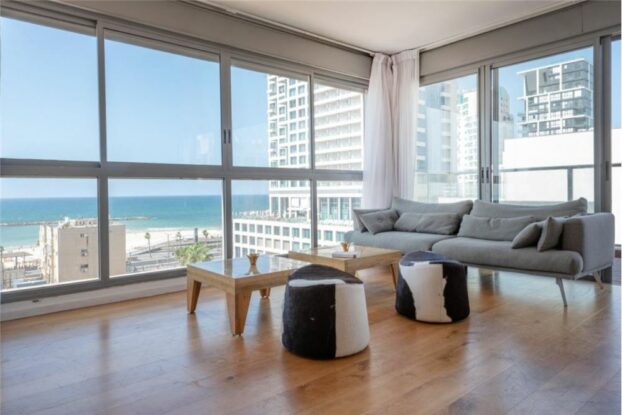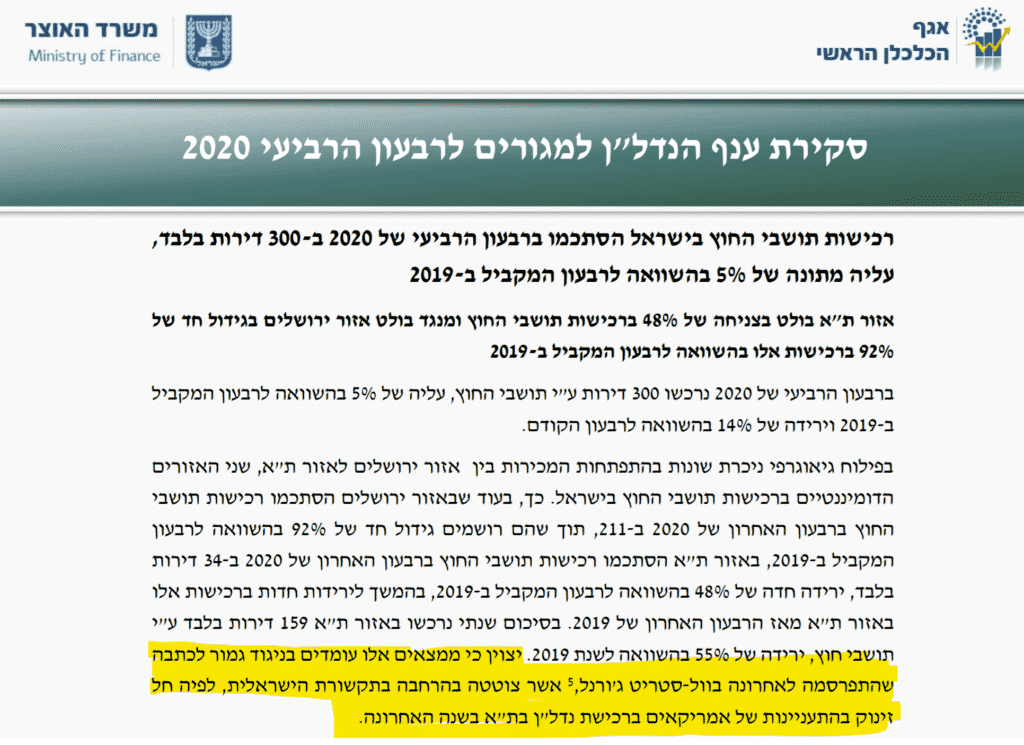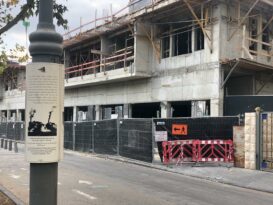Data from the Israeli Ministry of Finance shows there was a sharp 50% drop in apartment purchases by foreign residents in Tel Aviv, which appears to be in stark contrast to reports in the Wall Street Journal claiming that American buyers are “flooding” the Tel Aviv property market. On the other hand, Jerusalem has seen a steep 90% rise in deals with foreign residents. At the same time, there was a 77% increase in the number of apartments purchased by investors in the last quarter of 2020.
A report recently published by the Chief Economist’s department of the Ministry of Finance on the Israeli housing market, states that only 159 apartments in Tel Aviv and its surrounding cities were purchased by foreign residents in 2020. The data indicates a 55% decrease in purchases by foreign residents compared with the number of deals in 2019. These findings, the report states, are in contrast to an article published in the Wall Street Journal (WSJ) in March, according to which there was a surge of interest by Americans in purchasing real estate in Tel Aviv in the past year.
The article in the WSJ described the influx of American buyers that Tel Aviv’s residential property market has seen. It is not every day that a prestigious US business-focused newspaper publishes a feature on Israel, and thus the piece was quoted extensively by media outlets in Israel. However, the article caused many Israel real estate experts to raise their eyebrows in surprise. Indeed, there was a major difference in the number of foreign purchasers in 2020, but it was actually the reverse – they disappeared. Although the Israeli residential market was barely affected by Covid-19, with high demand and rising prices during 2020, the proportion of foreign buyers was negligible throughout the year.
According to data published by the Ministry of Finance, in the last quarter of 2020, foreign residents purchased 300 apartments in Israel, a slight rise of 5% compared to the same quarter in 2019. While the Jerusalem region registered 211 apartment purchases in the last quarter of 2020, an increase of 92% compared with the same quarter in 2019, in the Tel Aviv region, only 34 apartments were bought by foreign residents – a sharp decrease of 48% compared with the same quarter in 2019.
(It must be noted, however, that the report does not convey any findings on interest expressed by foreign residents, specifically Americans, in purchasing homes in Israel, neither does it refer to the breakdown of purchases by foreign buyers by countries, two market considerations to which Buyitinisrael believes the WSJ was referring.)
A comparison of the price of apartments purchased in 2020 by foreign residents, as opposed to Israeli residents, shows that in the main region for foreign buyers – Jerusalem – there were significant price differentials. “The implication is that foreign residents are not “competing” with Israelis for the same apartments”. The median price of an apartment purchased by foreign buyers was 2.6 million NIS – 59% higher than the median price of an apartment purchased by Israeli residents in the Jerusalem area. In the Tel Aviv region, the difference in median price between foreign resident buyers and local buyers was smaller, at 23%.
During the last quarter of 2020, a total of 28,700 apartments were purchased on the open market in Israel, which is a steep increase of 29% over the last quarter of 2019. However, this balances out the relatively low amount of apartment sales in the first half of 2020, due to the Corona crisis, and on an annual basis, there was very little difference in the number of deals.
In 2020 there were 93,400 apartments sold at market price – a level identical to 2019. When subsidized apartment purchases under the “Buyer’s Price” program are factored in, a total of 107,500 apartments were sold in 2020 – a decrease of 2% compared with 2019.
Despite the steep increase in the number of sales in the last quarter, the desirable Central Region registered a lower rise. In the Tel Aviv area, there was an increase of only 6% compared with the same quarter in 2019, and on an annual basis there was a slight decrease of 5% in the number of sales. In the Central Region there was a decrease of 8% on an annual basis.
The increase in sales in the last quarter of 2020 was due to all types of purchasers: first-time buyers (“young couples”) bought 11,000 apartments on the open market – an increase of 17% compared with the last quarter of 2019; and homeowners trading-up bought 11,400 apartments in the last quarter of 2020, an increase of 22% compared with the last quarter of 2019.
However, the most striking increase was in the number of apartments bought for investment purposes. Approximately 6,200 apartments were bought by investors in the last quarter of 2020, an increase of 77% over the same quarter in 2019. This is the largest number of apartments bought for investment purposes since the first quarter of 2016. In total, investors represented 19.4% of all apartment buyers, which is the highest percentage since the third quarter of 2016. The reason for the dramatic rise is the government’s decision last summer to reduce the rates of purchase tax, from a minimum rate of 8% to 5%.
The steep increase in investment purchases was reflected across all regions. The largest rise was in the Jerusalem region (including Bet Shemesh), which saw an increase of 120% in purchases by investors compared to the last quarter of 2019. In the Haifa region, there was an increase of 115% in the number of purchases, and in the Beer Sheva region, there was a rise of 105%. The smallest rise was in Tel Aviv’s property market, which only increased by 19% compared with 2019.
In addition, in the last quarter of 2020, investors sold 6,000 apartments, an increase of 33% compared with the same period last year. The data shows that many of these sellers were apparently forced to sell due to the corona crisis, since 13.8% of the sales by investors were made at a loss. Furthermore, the average capital gain made on apartment sales was 358,000 NIS – 20% lower than in the same quarter in 2019.
For the first time since the first quarter of 2016, the number of apartments purchased by investors was higher than the number of apartments sold by investors. Consequently, the stock of apartments held by investors in Israel has started to grow again, after shrinking over the last four and a half years by around 27,000 apartments.
This last item, perhaps more than any other data in the report, signifies the return of investors to the Israeli housing market, on their way to once again becoming a dominant element of the market. However, as noted above, the same cannot be said of foreign residents.









